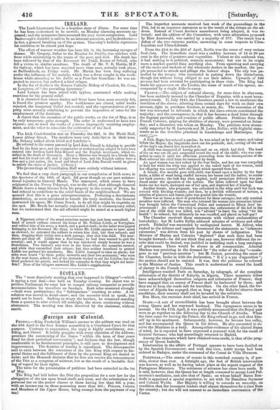IRELAND.
The Lord-Lieutenant lies in a hopeless state of illness. For some time be has been understood to be unwell; on Monday alarming accounts ap- peared; and the symptoms have assumed the very worst complexion. Lord Besborouglis disorder is said to be an internal aneurism, and hydrothorax- in fact, a general breaking up of the system. Thursday's bulletin represents hiS condition to be almost past hope.
The effect of warmer weather has been felt in the increasing ravages of disease. Me. Gregory, father to the Member for Dublin, was stricken with fever while ministering to the wants of the poor, and died. His death has been followed by that of the Reverend Dr. Traill, Rector of Schutt, who fell a victim to similar exertions. The death of Me. T. B. Martin, M.P. for Galway, which has been reported more than once, actually took place, at Ballinahinch, on Friday week. Mr. Martin has been long suffering under the influence of his malady, which was a fever caught in the work- house while attending to his duties as a Poor-law Guardian: he was ex- pected to recover, but suffered a fatal relapse.
In the list of deaths is the Roman Catholic Bishop of Clonfert, Dr. Coen, at Loughrea, of" the prevailing dysentery." Lord Lurgan has been seized with typhus, contracted while making exertions for the general relief.
It is observed that where famine and fever have been most severely felt, is found the greatest apathy. The workhouses are closed, relief works rejected, the temporary Relief Act evaded; and the representatives of pro- perty seem actually combining to prevent the imposition of rates for the employment of the destitute.
A report that the cessation of the public works, on the 1St of May, is to be only temporary, gains strength. The order is understood to have two objects; one, to weed the works of persons improperly receiving employ- ment, and the other to stimulate The Irish Confederation met on Thursday the 22d, in the Music Hall, Lower Abbey Street. The speakers were very AetirSeXee in their tone. Mr. Doheny talked about blood and hetchetS--s
_lie referred to the course pursued by Lord John .P.tisseil in delaying to provide food for the Irish poor, and the compromise or understanding alleged to have been entered into between Lord John Russell and the English merchants, which re- sulted in the death of thousands. Many a Minister was brought to a bloody fate, and had his head cut off; and if right were done, and the English nation were a free and a just nation, the head and blood of Lord John Russell would be given to satisfy the claim of justice. (Cheers.)
The proceedings at Conciliation Hall were entirely without interest.
We find that a very short paragraph in our compilation of Irish news, in the Spectator of the 10th of April, did great though on our part uninten- tional injustice to General Meade. The statement, which seems to have originated in the Newry Telegraph, was to the effect, that although General Meade draws a large income from his property in the county of Down, he had refused to contribute to the relief funds of the neighbourhood. We are assured that this is a gross misrepresentation. Preferring a discriminate distribution, as most calculated to benefit the truly destitute, the General instructed his agent, Mr. Crane Brush, to do all that might be requisite on the spot. Mr. Brash has actually expended 1,5601. in eleemosynary relief; but we understand that the aid afforded might be stated at a much higher sum.
A Tipperary crime of the usual atrocious nature has just been committed. A band of armed ruffians entered the house of Mr. William Liddle, at Terryglass, and robbed him of his arms, a watch, and a pocket-book; in the latter were papers belonging to the Reverend Mr. Syng, to whom Mr. Liddle appears to have acted as steward; he entreated the robbers to return him that, but they refused; sad then, dragging their victim into a dark passage, they shot him dead. The mur- derers got clear off. Liddle was a Scotehman; he had been warned to quit the country; and it would appear that he was butchered simply because he was a Beotchman. Two farmer's sons were in the house when the assassins entered, and while they committed their crimes; but they neither interfered to protect Liddle nor pursued his murderers. Mrs. Liddle managed to raise an alarm; her cries were heard "by three public stewards and their two assistants," who were in the next house, armed; two of the stewards wished to aid the Liddles; but the third pocketed the pistols, and locked his comrades in that they might not inter- fere I None of the villagers answered Mrs. Liddle's supplications. PeS cultivation of the teed.


























 Previous page
Previous page